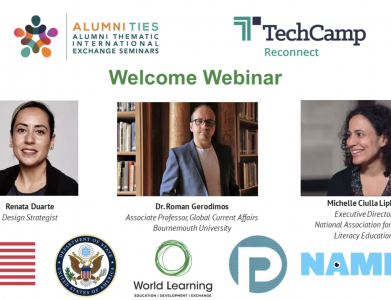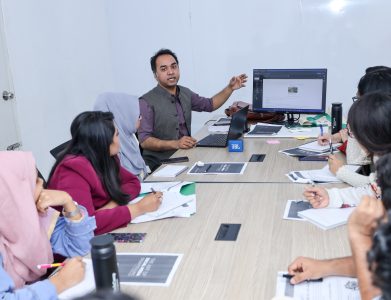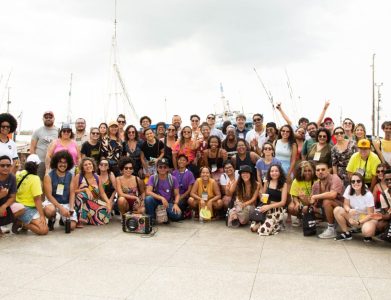As our lives become increasingly reliant on technology and social media for news, disinformation is proliferating at a global scale.
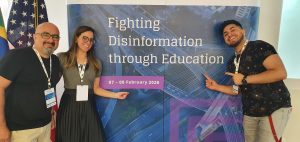
Disinformation is especially problematic in Brazil. According to an Ipsos Institute poll conducted in 27 countries, Brazil ranks first among those whose citizens said they have read and believed in fake news. In order to combat this problem and promote good governance, TechCamp Brazil aimed to counter disinformation by promoting media literacy education in Brazil.
Why Media Literacy Education?
While media literacy is seen by many experts as one of the best ways to fight mis- and dis-information, the topic was still unknown to a majority of Brazilians. In 2018, Brazilian legislation ruled that media literacy should be taught in all schools by 2020, but there was a lack of well-developed pedagogic materials in Portuguese to teach the topic in schools. That’s where TechCamp Brazil comes in. In partnership with the Palavra Aberta Institute, the TechCamp team formulated a grassroots approach to implement digital media literacy projects in public schools. By bringing a network of educators, design thinkers, game developers, activists, community organizers, librarians, and journalists together, TechCamp participants were able to innovatively approach education.
With representatives from each of the 26 Brazilian states and the Federal District, TechCamp Brazil set up an extensive network and infrastructure to share knowledge about media literacy education. Thanks to the breadth of participants, experts will continuously reach new audiences, amplifying the dissemination of media literacy curriculum.
Education Strategies
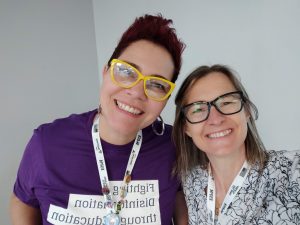
Soraya Lacerda, a star TechCamp trainer and MakerSpace coordinator for Casa Thomas Jefferson, promotes active methodologies to help students understand media literacy. To Lacerda, media literacy is the ability to read, write, and interact in media environments in a way that enables us to act more democratically and fairly with each other. She finds parallels between maker-centered learning and media literacy, incorporating this educational framework into TechCamp Brazil 2020. Maker empowerment develops three main capacities: the ability to see how things work and how they’re connected; the capacity to explore complexity; and the innovation to solve problems and challenges. These skills directly apply to how TechCamp Brazil encourages students to dissect news sources. First, students should reflect on and critically think about the media they encounter. After examining it closely, they can ask the following questions: “What are the voices and interests behind this news piece? Is it biased? Which point of views are not represented?” Then, students are encouraged to problem solve by seeking sources with differing points of view. This is all part of the media literacy curriculum TechCamp promotes – to not allow students to accept media at face value but to question it, examine it, and seek more information.
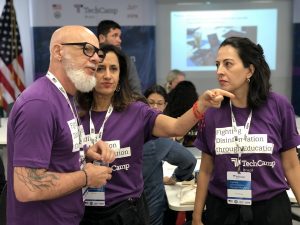
Luciano Meira, the cofounder of Joystreet and a trainer for TechCamp Brazil 2020, taught participants how to use gamification as a powerful strategy for student engagement. Through an architecture of missions and challenges, he encouraged participants to frame media literacy education in a dynamic structure based on students’ competencies and abilities. Using game mechanics is an exciting way to teach students how to solve problems and engage with the material through fun theory and positive rewards. Luciano’s expertise is just one example of the exciting methodologies TechCamp Brazil used to expand media literacy education.
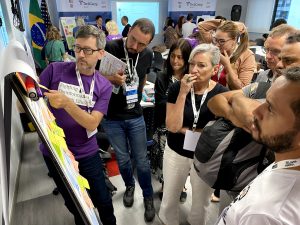
The Information Age has greatly expanded our access to knowledge – but with this increased freedom to share, create, and consume content, comes great responsibility. Media education teaches students how to read critically and participate actively in our interconnected world. By focusing on educating children, who have grown up in this digital environment, TechCamp Brazil is creating a generation of informed and conscious leaders who will hopefully break the cycle of falling prey to catchy headlines and sensationalized stories.
